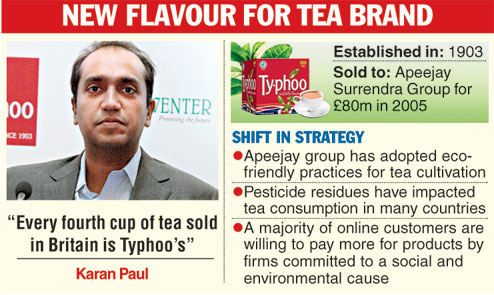
New Delhi, May 17: Industrialist Karan Paul is pouring an organic cup of Typhoo tea to win over India.
Paul, a Calcuttan and a scion of the Apeejay group, is brewing a strategy based on eco-friendly principles to prise open the Indian market for Typhoo, a 112-year-old British brand. And for that he has adopted the frog insignia of NGO Rainforest Alliance as the cornerstone of his leapfrog marketing tactic envisaged for Typhoo in India.
Paul had bought Typhoo, Britain's second-largest tea brand by volume, around 10 years ago to enter the global branded tea business and has not looked back since then. "Every fourth cup of tea sold in Britain is Typhoo's," Paul said in an interaction with The Telegraph.
However, in India, which accounts for 31 per cent of world consumption, Typhoo remained a much smaller player. Globally, too, Unilever's Lipton and Tata's Tetley were formidable opponents.
Therefore, Paul chose to do something unconventional - adopt the frog. He decided to take up environmentally sustainable cultivation practices in collaboration with Rainforest Alliance in Apeejay group's gardens as well as among the suppliers of the crop for his brand. The frog, which is international NGO Rainforest's sustainable stamp of approval for a firm adopting green practices, will now be on Typhoo packs.
The Apeejay group has decided to absorb the additional costs, which include shunning chemical fertilisers and pesticides, leading to profit erosion in the short run.
However, in the long run the advantage of being the country's first environmentally sustainable tea may help his brand leapfrog its rivals because urbane consumers here follow the global trend of being aware of eco-friendly principles.
In marketing parlance, a leapfrog strategy is defined as a way to surpass superior competition in business by employing tactics that result in extraordinary growth and profit.
"Globally ethical or environmentally conscious customers are pushing firms to make choices towards sustainable manufacturing. This trend is higher in food marketing and is being driven to a great extent by online selling," marketing strategist Sandip Roy said.
Fifty-five per cent of online consumers across 60 countries say they are willing to pay more for products and services provided by companies committed to positive social and environmental impact, according to a study by Nielsen last year. The propensity to buy socially responsible brands is strongest in Asia-Pacific (64 per cent), Latin America (63 per cent) and West Asia/Africa (63 per cent) followed by North America (42 per cent and Europe (40 per cent).
Media reports and studies, which highlight the presence of pesticide residues in Indian tea, have already forced it off the table in many countries, prompting gardens that supply to big global brands and supermarket chains to adopt the "frog".
A Greenpeace study have shown that 94 per cent of samples bought in urban metropolitan India contained about 34 kinds of pesticide residues.
"Percolating down of the information against chemicals used in the food and beverage industry is happening and people have started making choices. As time goes by, the movement towards 'Green' certified foods and drinks will gain strength," Roy said. That is exactly what Paul is banking on - more retail shelf space with a difference.
The push to sell more Typhoo tea will be accompanied by a message - drink tea that is sustainable for the consumer and the environment.
Whether the frog helps Paul to beat the likes of Brooke Bond, Tata Tea, Lipton, Duncan or even Wagh Bakri, is something that time will tell.











